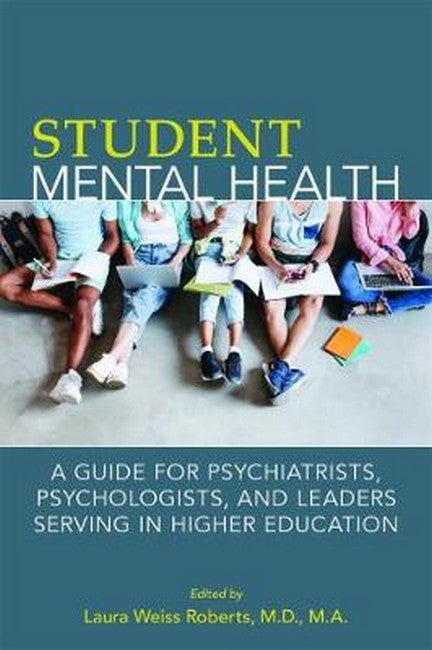ContributorsForeword Preface AcknowledgmentsPart I: OverviewChapter 1. Student Mental Health Chapter 2. Creating a Culture of Belonging, Respect, and Support on CampusChapter 3. Strategies for Excellence in Student Health Programs Chapter 4. Burnout and Self-Care of Clinicians in Student Mental Health ServicesPart II: Life Transitions and the Student ExperienceChapter 5. Student Self-Care, Wellness, and Resilience Chapter 6. Adaptation and Stress Chapter 7. A Developmental Perspective on Risk Taking Among College StudentsChapter 8. Friendships and Romantic Relationships of College Students Chapter 9. Family Relationships During the College Years Chapter 10. Distress and Academic JeopardyPart III: Caring for Students With Mental Health IssuesChapter 11. Psychiatric Evaluation of the Young Adult University StudentChapter 12. Mood and Anxiety Disorders Chapter 13. Attention-Deficit/Hyperactivity Disorder and Learning Disorders Chapter 14. Alcohol and Substance Use and Co-occurring BehaviorsChapter 15. Eating Disorders and Body Image Concerns Chapter 16. Stress and TraumaChapter 17. Sleep DisordersChapter 18. Intervening Early in First-Episode Psychosis in a College Setting Chapter 19. Autism Spectrum DisorderChapter 20. The Suicidal Student Chapter 21. Response to Survivors of Campus Sexual AssaultChapter 22. Brief and Medium-Term Psychosocial Therapies at Student Health CentersChapter 23. Innovation, Technology, and Student Well-BeingPart IV: Fostering Mental Health for Distinct Student PopulationsChapter 24. First-Generation College StudentsChapter 25. Students of Color Chapter 26. Lesbian, Gay, Bisexual, Transgender, and Queer/Questioning Students Chapter 27. Transgender StudentsChapter 28. Student-Athlete Mental HealthChapter 29. Military and Veteran StudentsChapter 30. Graduate Students and Postdoctoral Fellows Chapter 31. Medical Students, Residents, and FellowsIndex

